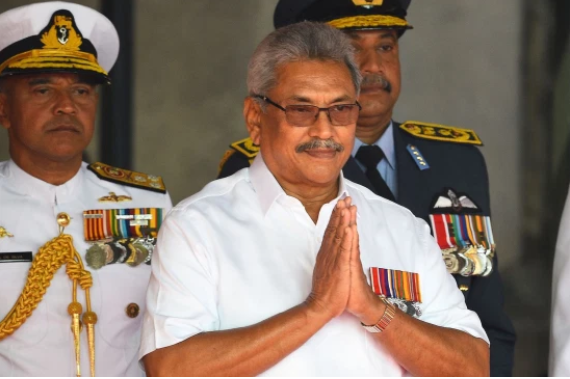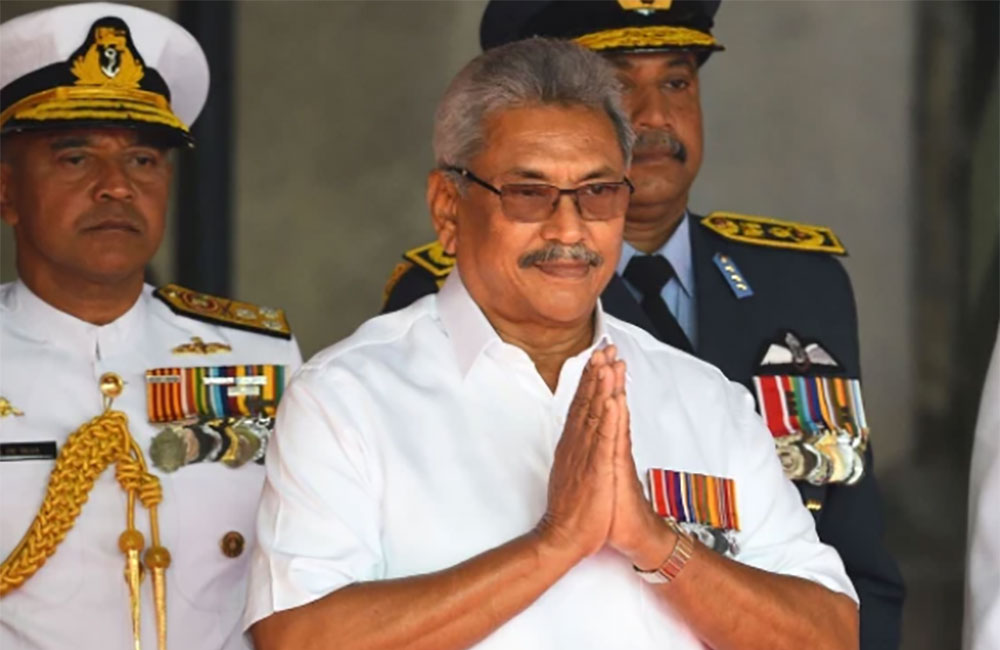 Sri Lanka's President Gotabaya Rajapaksa (center) gestures during Sri Lanka's 72nd Independence Day celebrations in Colombo on Feb. 4. ISHARA S. KODIKARA/AFP via Getty Images
Sri Lanka's President Gotabaya Rajapaksa (center) gestures during Sri Lanka's 72nd Independence Day celebrations in Colombo on Feb. 4. ISHARA S. KODIKARA/AFP via Getty Images
Rajapaksa won the election in November, taking the seat once held by his brother. In February, at his first Independence Day celebration, he declared, once again, his respect for human rights: “The responsibilities of the civilian and military establishments need to be clearly understood, and we must always remember that citizens have individual as well as collective rights.” Dressed in civilian attire, Rajapaksa nonetheless donned badges awarded to him during his long military career. Perhaps it was a hint of what was to come.
In the last several months, Rajapaksa has embarked on rapidly militarizing the state administration. He has appointed a number of retired military officers to key positions in the civil administration, and his government has moved more than 30 agencies under the remit of the defense ministry.
Moves such as his lengthy dissolution of Parliament and his shock pardon of a sergeant recently sentenced to death for killing eight civilians, including children, during the country’s civil war suggest a disdain for the legal system and constitution. With each passing day, Sri Lanka appears to be edging closer toward military totalitarianism.
Rajapaksa’s authoritarian transition should not be surprising. A brother of Mahinda Rajapaksa—who served as president from 2005 to 2015 and has since been appointed as prime minister—Gotabaya Rajapaksa is best known for defeating the separatist Tamil Tigers and bringing an end to a three-decade-long civil war in 2009. An estimated 40,000 Tamil civilians died during the final months, and as many as 100,000 civilians from both sides were killed since the start of the war in 1983. Tens of thousands more forced disappearances took place during and after the civil war, and efforts to provide justice for the victims have stalled. Earlier this year, the government withdrew altogether from a co-sponsored United Nations Human Rights Council resolution to investigate and prosecute those responsible for civil war atrocities.
There is little chance that such justice will be forthcoming. Speaking at a remembrance ceremony for fallen soldiers in Colombo on May 19, Rajapaksa vowed to protect those who fought in the civil war and said that he would not hesitate to withdraw from international organizations that target them. Already, the president appears to be signaling that security forces and police can act with impunity. In March, Rajapaksa pardoned and released Sunil Ratnayake, a former Sri Lankan army staff sergeant convicted of the brutal murder of eight Tamil civilians, including three children—one of the very few soldiers to face trial.
Rajapaksa himself has faced, and denied, repeated accusations of war crimes and atrocities. In his eight months in office, he has appointed a series of military commanders who have been accused of serious alleged international crimes during the civil war—commanders who currently hold high-level government positions. Sri Lanka is “intentionally and deliberately promoting … impunity by appointing alleged war criminals to positions of power,” the International Truth and Justice Project said in a recent investigation.
Former senior military officials have been put in charge of the Ministry of Law and Order, the Ministry of Human Resources, the Ministry of Finance, and, now, with the COVID-19 crisis, the Ministry of Health. In addition to appointing ex-military officers into civil sector positions, the government has also started handing civil administrative functions to the military. Reporting by the Tamil Guardian shows that at least 37 agencies including the police, the telecommunications regulator, and the nongovernmental organization secretariat have been wholly placed under the Ministry of Defense. Separately, the president has set up at least seven new task forces, with vague and far-reaching mandates, staffed heavily by military officials.
Recent wrangling in Parliament, meanwhile, shows the extent to which Rajapaksa is willing to bend Sri Lanka’s constitution to his will. On March 2, Rajapaksa legally (but six months ahead of schedule) dissolved Parliament, setting the election date to April 25. Since then, in response to the coronavirus crisis, he has repeatedly pushed the date back, with elections now planned for Aug. 5. The constitution mandates that Parliament meet again within three months of its dissolution, but Rajapaksa has denied requests by opposition parties urging to reconvene. The Supreme Court has also refused petitions to order Parliament be reconvened and has ignored challenges on the delayed poll date, although it has yet to explain its reasoning.
Yet reconvening Parliament is now even more urgent thanks to the coronavirus pandemic. The only legal way for the government to formalize budgets for fighting the virus is to go through the legislature. Finances are now being appropriated and disbursed by the President’s Fund, which is allocating nearly $2 billion in pledged foreign assistance to combat the coronavirus—though without parliamentary oversight there is little transparency to the process.
While Rajapaksa’s machinations over the past months may have drawn withering criticism from watchdogs and rights activists, it is unclear how this has affected his popularity among the wider public. Rajapaksa is hoping the Aug. 5 vote will seal his grip on power after he won last year’s election on a seemingly popular national security agenda. If his Sri Lanka People’s Front party can obtain a two-thirds majority, he has promised that one of his first efforts will be to repeal the 19th Amendment, which limits executive power.

Leave your comments
Login to post a comment
Post comment as a guest